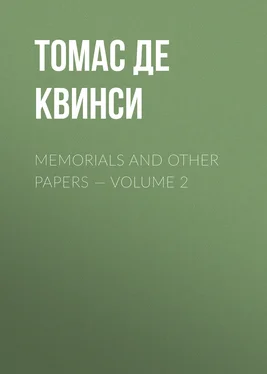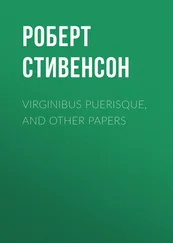Томас Де Квинси - Memorials and Other Papers — Volume 2
Здесь есть возможность читать онлайн «Томас Де Квинси - Memorials and Other Papers — Volume 2» — ознакомительный отрывок электронной книги совершенно бесплатно, а после прочтения отрывка купить полную версию. В некоторых случаях можно слушать аудио, скачать через торрент в формате fb2 и присутствует краткое содержание. Жанр: foreign_prose, literature_19, foreign_antique, на английском языке. Описание произведения, (предисловие) а так же отзывы посетителей доступны на портале библиотеки ЛибКат.
- Название:Memorials and Other Papers — Volume 2
- Автор:
- Жанр:
- Год:неизвестен
- ISBN:нет данных
- Рейтинг книги:4 / 5. Голосов: 1
-
Избранное:Добавить в избранное
- Отзывы:
-
Ваша оценка:
- 80
- 1
- 2
- 3
- 4
- 5
Memorials and Other Papers — Volume 2: краткое содержание, описание и аннотация
Предлагаем к чтению аннотацию, описание, краткое содержание или предисловие (зависит от того, что написал сам автор книги «Memorials and Other Papers — Volume 2»). Если вы не нашли необходимую информацию о книге — напишите в комментариях, мы постараемся отыскать её.
Memorials and Other Papers — Volume 2 — читать онлайн ознакомительный отрывок
Ниже представлен текст книги, разбитый по страницам. Система сохранения места последней прочитанной страницы, позволяет с удобством читать онлайн бесплатно книгу «Memorials and Other Papers — Volume 2», без необходимости каждый раз заново искать на чём Вы остановились. Поставьте закладку, и сможете в любой момент перейти на страницу, на которой закончили чтение.
Интервал:
Закладка:
This last consideration reminded Paulina suddenly, as of a very singular circumstance, that the appearance of the light had been followed by no challenge from the sentinel. And then first she remembered that for some time she had ceased to hear the sentinel's step, or the rattle of his bandoleers. Hastily looking along the path, she discovered too certainly that the single sentinel posted on that side of their encampment was absent from his station. It might have been supposed that he had fallen asleep from the severity of the cold; but in that case the lantern which he carried attached to his breast would have continued to burn; whereas all traces of light had vanished from the path which he perambulated. The error was now apparent to Paulina, both in having appointed no more than one sentinel to this quarter, and also in the selection of his beat. There had been frequent instances throughout this war in which by means of a net, such as that carried by the Roman retiarius in the contests of the gladiators, and dexterously applied by two persons from behind, a sentinel had been suddenly muffled, gagged, and carried off, without much difficulty. For such a purpose it was clear that the present sentinel's range, lying by the margin of a wood from which his minutest movements could be watched at leisure by those who lay in utter darkness themselves, afforded every possible facility. Paulina scarcely doubted that he had been indeed carried off, in some such way, and not impossibly almost whilst she was looking on.
She would now have called aloud, and have alarmed the camp; but at the very moment when she let down the glass the savage landlord reappeared, and, menacing her with a pistol, awed her into silence. He bore upon his head a moderate-sized trunk, or portmanteau, which appeared, by the imperfect light, to be that in which some despatches had been lodged from the imperial government to different persons in Klosterheim. This had been cut from one of the carriages in her suite; and her anxiety was great on recollecting that, from some words of the emperor's, she had reason to believe one, at least, of the letters which it conveyed to be in some important degree connected with the interests of her lover. Satisfied, however, that he would not find it possible to abscond with so burdensome an article in any direction that could save him from instant pursuit and arrest, she continued to watch for the moment when she might safely raise the alarm. But great was her consternation when she saw a dark figure steal from a thicket, receive the trunk from the other, and instantly retreat into the deepest recesses of the forest.
Her fears now gave way to the imminence of so important a loss; and she endeavored hastily to open the window of the opposite door. But this had been so effectually barricaded against the cold, that she failed in her purpose, and, immediately turning back to the other side, she called, loudly,—"Guard! guard!" The press of carriages, however, at this point, so far deadened her voice, that it was some time before the alarm reached the other side of the encampment distinctly enough to direct their motions to her summons. Half a dozen yagers and an officer at length presented themselves; but the landlord had disappeared, she knew not in what direction. Upon explaining the circumstances of the robbery, however, the officer caused his men to light a number of torches, and advance into the wood. But the ground was so impracticable in most places, from tangled roots and gnarled stumps of trees, that it was with difficulty they could keep their footing. They were also embarrassed by the crossing shadows From the innumerable boughs above them; and a situation of greater perplexity for effective pursuit it was scarcely possible to imagine. Everywhere they saw alleys, arched high overhead, and resembling the aisles of a cathedral, as much in form as in the perfect darkness which reigned in both at this solemn hour of midnight, stretching away apparently without end, but more and more obscure, until impenetrable blackness terminated the long vista. Now and then a dusky figure was seen to cross at some distance; but these were probably deer; and when loudly challenged by the yagers, no sound replied but the vast echoes of the forest. Between these interminable alleys, which radiated as from a centre at this point, there were generally thickets interposed. Sometimes the wood was more open, and clear of all undergrowth—shrubs, thorns, or brambles—for a considerable distance, so that a single file of horsemen might have penetrated for perhaps half a mile; but belts of thicket continually checked their progress, and obliged them to seek their way back to some one of the long vistas which traversed the woods between the frontiers of Suabia and Bavaria.
In this perplexity of paths, the officer halted his party to consider of his further course. At this moment one of the yagers protested that he had seen a man's hat and face rise above a thicket of bushes, apparently not more than a hundred and fifty yards from their own position. Upon that the party were ordered to advance a little, and to throw in a volley, as nearly as could be judged, into the very spot pointed out by the soldier. It seemed that he had not been mistaken; for a loud laugh of derision rose immediately a little to the left of the bushes. The laughter swelled upon the silence of the night, and in the next moment was taken up by another on the right, which again was echoed by a third on the rear. Peal after peal of tumultuous and scornful laughter resounded from the remoter solitudes of the forest; and the officer stood aghast to hear this proclamation of defiance from a multitude of enemies, where he had anticipated no more than the very party engaged in the robbery.
To advance in pursuit seemed now both useless and dangerous. The laughter had probably been designed expressly to distract his choice of road at a time when the darkness and intricacies of the ground had already made it sufficiently indeterminate. In which direction, out of so many whence he had heard the sounds, a pursuit could be instituted with any chance of being effectual, seemed now as hopeless a subject of deliberation as it was possible to imagine. Still, as he had been made aware of the great importance attached to the trunk, which might very probably contain despatches interesting to the welfare of Klosterheim, and the whole surrounding territory, he felt grieved to retire without some further attempt for its recovery. And he stood for a few moments irresolutely debating with himself, or listening to the opinions of his men.
His irresolution was very abruptly terminated. All at once, upon the main road from Klosterheim, at an angle about half a mile ahead where it first wheeled into sight from Waldenhausen, a heavy thundering trot was heard ringing from the frozen road, as of a regular body of cavalry advancing rapidly upon their encampment. There was no time to be lost; the officer instantly withdrew his yagers from the wood, posted a strong guard at the wood side, sounded the alarm throughout the camp, agreeably to the system of signals previously concerted, mounted about thirty men, whose horses and themselves were kept in perfect equipment during each of the night-watches, and then advancing to the head of the barriers, prepared to receive the party of strangers in whatever character they should happen to present themselves.
All this had been done with so much promptitude and decision, that, on reaching the barriers, the officer found the strangers not yet come up. In fact, they had halted at a strong outpost about a quarter of a mile in advance of Waldenhausen; and though one or two patrollers came dropping in from by-roads on the forest-heath, who reported them as enemies, from the indistinct view they had caught of their equipments, it had already become doubtful from their movements whether they would really prove so.
Читать дальшеИнтервал:
Закладка:
Похожие книги на «Memorials and Other Papers — Volume 2»
Представляем Вашему вниманию похожие книги на «Memorials and Other Papers — Volume 2» списком для выбора. Мы отобрали схожую по названию и смыслу литературу в надежде предоставить читателям больше вариантов отыскать новые, интересные, ещё непрочитанные произведения.
Обсуждение, отзывы о книге «Memorials and Other Papers — Volume 2» и просто собственные мнения читателей. Оставьте ваши комментарии, напишите, что Вы думаете о произведении, его смысле или главных героях. Укажите что конкретно понравилось, а что нет, и почему Вы так считаете.












